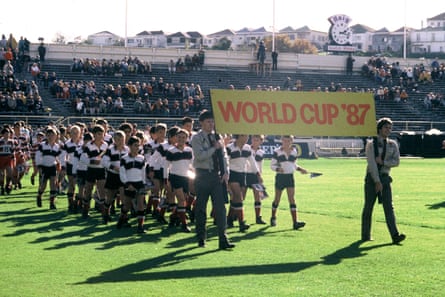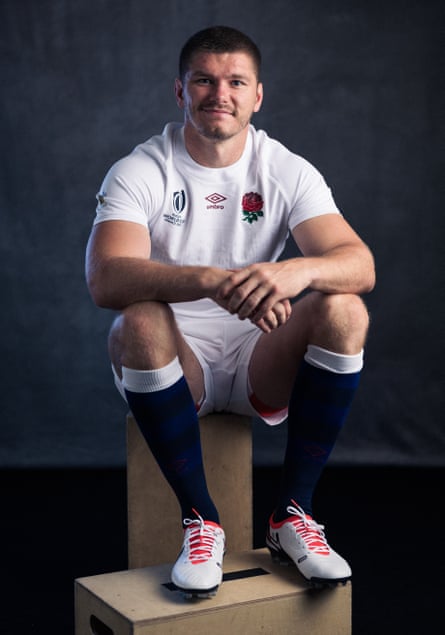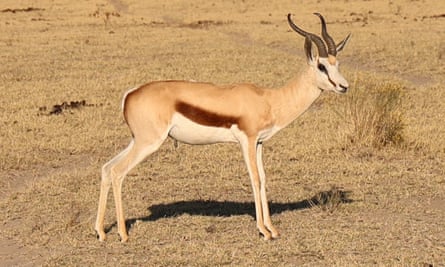Is it already time for another World Cup? The men’s Rugby World Cup is indeed upon us, four years after the last one, and the Webb Ellis Cup is the prize.
Rugby is people with big muscles and tight shorts smashing into each other, right? You’re thinking of rugby league, the 13-a-side version. Rugby union is a far more nuanced contest of skill, strength and tactical cunning. And people with big muscles smashing into each other, but 15-a-side.
Where is it? France, the hosts, kick off against New Zealand in Paris on Friday. Saint-Étienne, Bordeaux, Marseille, Toulouse, Lille, Lyon, Nice and Nantes will all host matches and the final is on 28 October, back at the Stade de France, after seven punishing weeks (of watching on TV).

Who is, or was, William Webb Ellis? Legend has it that the schoolboy picked up the ball and ran with it during a football match at Rugby school in 1823, and the game of rugby was born. It’s a neat story that isn’t actually true, but neither the fans nor World Rugby, the game’s governing body, seem to care.
What are the basics? Players can carry and kick the ball forwards, but are only permitted to pass backwards. You get five points for touching the ball down on or behind the opponent’s try-line, two for a conversion (the kick after a try), and three for a penalty or drop goal.

Who will win? It’s wide open, with several teams capable of going all the way. New Zealand won the first one in 1987 and back-to-back trophies in 2011 and 2015. South Africa triumphed in 1995, 2007 and 2019. Australia won it in 1991 and 1999, but they are far from favourites this year. England are the only northern hemisphere side to win a World Cup, back in 2003. History strongly suggests, therefore, that it will be South Africa or New Zealand who lift the trophy. France are heavily fancied too, mind you, along with Ireland, the Six Nations grand slam champions and the world’s No 1-ranked team.
Scrums are to do with project management, right? No, the scrum is a complex affair involving eight players from either side, but boils down to which team can shove hardest. Supremacy at scrums allows the team’s backs – scrum-halves, fly-halves, centres and wings – space and time to play. Sometimes the referee will blow their whistle and award a penalty to one side or the other, and the experts will have little idea why. Therefore, if you don’t understand what’s going on, it’s nothing to worry about. Just mumble something about the “dark arts” and have another sip of beer.
Do they have VAR? The TMO (television match official) is a longstanding facet of the professional game. It can be controversial, but the ability to hear officials discuss their decision-making process makes it a more viewer-friendly experience than football’s dreaded VAR. Procedural changes for this World Cup include a shot-clock for kickers: 90sec for conversions, 60sec for penalty kicks. The clock will be visible on stadium screens and on TV. Another tweak is the bunker review system for yellow and red cards. A referee can now issue a yellow card and ask for the offence to be reviewed by the “foul play review officer”, who may upgrade to a red.
Why are the players so massive? Until 1995 rugby union was an amateur sport: the forwards tended to be naturally large specimens, while the backs were generally smaller and much faster. The new era of professionalism ushered in a strength and conditioning arms race, allied to improvements in nutrition and sports science, that has seen the average player turn into a finely tuned – and very large – athlete. There is a saying that rugby used to be a game of evasion, whereas now it’s a game of collision. The truth is somewhere in between. There are still some old-fashioned, pacy lightweights among the backs: Italy’s Ange Capuozzo, for example.
England invented rugby, so they must be one of the favourites? Not quite. They made the final last time, where they were soundly beaten by South Africa. England’s head coach at the time, Eddie Jones, was jettisoned by the Rugby Football Union last December and Steve Borthwick took over with limited time to prepare. Recent results and performances have been far from ideal: a first defeat by Fiji last month was regarded as a new low.
So Jones will be cheering on England from his sofa? No, he’s taken over as Australia’s head coach, and may end up plotting his former team’s downfall. Always handy to have inside information on your (potential) opposition. The host nation’s defence, meanwhile, is now marshalled by an English coach, Shaun Edwards. The former rugby league player and Wales assistant coach has been partly credited with putting an end to the old cliche about never knowing which France will turn up.
after newsletter promotion

Who are some of the other players, and people, to watch? Owen Farrell is the England captain, although unfortunately for them, he’s banned for their first two matches. Andy Farrell, the former cross-code player and Owen’s dad, is Ireland’s head coach. They are both bored of being asked questions about each other, but that will not stop journalists asking. Meanwhile Antoine Dupont, the France scrum-half and captain, was catapulted into themainstream by last year’s viral cover shoot for GQ France, when he wore a canary-yellow dressing gown. Siya Kolisi, South Africa’s first black captain, led them to glory in Japan and has recovered from serious injury to have another go in France.
How do I sound like I know what I’m talking about? Simply say: Did you know England won 92% of their lineouts in the 2023 Six Nations, more than any other team?
Stick a bet on Ireland, then? You could do a lot worse – although it is worth bearing in mind Ireland are on the tougher side of the draw, in South Africa’s pool, with France or New Zealand their expected opposition if they reach the quarter-finals. The good news from an Irish perspective is that they waited 111 years to beat the All Blacks, but since first achieving the feat in 2016, they’ve now done it five times. That includes a 2-1 success in a three-Test series on New Zealand soil last summer. Scotland, ranked fifth in the world, are in Ireland’s pool and will rely on their brilliant fly-half Finn Russell. England have Argentina and Japan and, if they get through, potentially Australia or Wales to deal with on the other side of the draw. Wales have a veteran coach in the New Zealander Warren Gatland, an interesting mix of experienced and untested players, and a tough-looking pool including Fiji (ranked seventh in the world, three places higher than Wales) and Georgia alongside the Wallabies.
What other jargon will I need? Nicknames are a decent place to start: South Africa are the Springboks, New Zealand are the All Blacks, Australia = Wallabies, Argentina = Pumas. France are Les Bleus and similarly, Italy are the Azzurri.

What else do I need to know? A “ruck” doesn’t mean a fight. A ruck is what happens after a player is tackled and the ball is on the ground. A lineout is a bit like a throw-in in football, although possession is often contested by several members from each side. The scrum and lineout combined is known as the set piece, and these elements have a massive bearing on the outcome of any match. Without a smoothly functioning set piece, it’s impossible to make the most of ball possession.
And the buildup has presumably been controversy-free? Mais non. An investigation into “favouritism, influence peddling, corruption” at the organising committee is continuing after raids on their Paris headquarters last November. France, meanwhile, have called up Bastien Chalureau, a forward who has received a suspended prison sentence for a racially motivated attack in Toulouse in 2020. (Chalureau has admitted to the attack, but denies it was racially motivated and is appealing that part of the ruling.) Riots erupted across France last month after the fatal shooting by police of Nahel, a teenager of Algerian and Moroccan descent, during a traffic stop in Paris. Planned strikes by air traffic controllers are also threatening to cause chaos.
